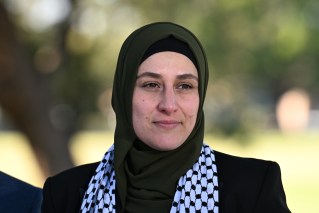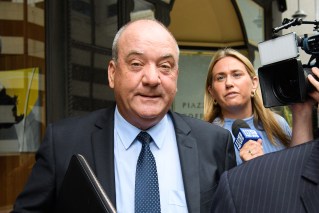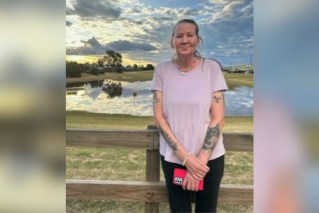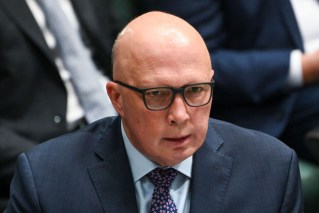The federal government won’t say if it will increase its 2030 emissions reduction target, despite being required to do so under an agreement from the Glasgow COP26 summit, in a move branded “disappointing” by Labor and climate groups.
But Opposition Leader Anthony Albanese is also remaining cagey on his climate goals, resisting calls to release Labor’s 2030 plan and giving no certainty on when it would be detailed.
“We’ve set our target. But what we’ll continue to do is update our projections. But the target has been set,” Health Minister Greg Hunt said on Insiders on Sunday, when asked about the government’s 2030 pledge.
The COP26 climate summit ended on Sunday, with all parties – including Australia – signing onto an agreement to “revisit and strengthen their current emissions targets to 2030, known as Nationally Determined Contributions (NDCs), in 2022”.

Scott Morrison and Energy Minister Angus Taylor. Photo: AAP
Prime Minister Scott Morrison declined to officially update his Coalition government’s 2030 target for emissions reduction, sticking to the Tony Abbott-era target of 26 to 28 per cent.
But while he stopped short of formalising his revised forecasts, he told the conference the government projected emissions to drop by 30 to 35 per cent by 2030.
The government’s net-zero modelling, released on Friday, forecast Australia to still be a major supplier of coal by 2050, and for gas mining to increase.
In a statement following COP26, Energy Minister Angus Taylor and Foreign Minister Marise Payne said they welcomed the final outcome, but made no comment on whether Australia would follow through on the agreement to boost its 2030 target.
“Australia’s 2030 target is fixed and we are committed to meeting and beating it, as we did with our Kyoto-era targets,” Mr Taylor and Senator Payne said.
“The Morrison government will always stand up for and make decisions in Australia’s national interest, and we will do what’s right for rural and regional communities.”
Tweet from @InsidersABC
Mr Hunt was the environment minister when the Abbott government signed up to the 26 to 28 per cent emissions reduction pledge.
In the Insiders interview, he repeatedly skirted around answering whether that target would be upgraded.
“We welcome the outcome at Glasgow. It’s important progress for the world. It’s important protection for Australia,” Mr Hunt said.
“We have already set out that we have a 2050 target of net zero, a 2030 target of minus 26 to minus 28 per cent on our 2005 emissions.”
Host David Speers pressed Mr Hunt several times on whether the target would increase, but the Health Minister would only say that the government had “a clear target and what we change is our projections”.
Referencing William Shakespeare’s Henry IV, Mr Hunt said Australia would “under-promise, over-deliver.”
Environment groups said the Glasgow outcome meant the Australian government needed to boost the target.
The Climate Council said there was now “enormous pressure on Australia to step up its efforts”, claiming the federal government was building an unwanted reputation as a “laggard and blocker” on the world stage.
“The federal government showed up empty handed to a pivotal moment in the fight for our future. They’ve let down our Pacific neighbours, as well as Australians who do not deserve to endure more frequent and severe bushfires, floods, droughts and heatwaves,” said Climate Council head of research Dr Simon Bradshaw.
“Our government must come back to the table next year with a stronger 2030 target. It’s time to slash carbon pollution this decade, as if our futures depended on it – because they do.”
Tweet from @climatecouncil
Greens leader Adam Bandt said Australia would face “huge pressure” internationally to lock in more ambitious emissions goals.
He said both the Coalition and Labor should be looking to “science-based 2030 targets that keep the Paris Agreement 1.5-degree goal alive”, calling for a 75 per cent emissions cut.
Labor shadow treasurer Jim Chalmers was also critical of the government for not setting out more “ambitious” medium-term targets.
“The global community is disappointed in Australia’s lack of effort,” he said on Sunday.
“I welcome any progress in Glasgow, but I think it’s terribly disappointing that Australia has not played a constructive role in the outcomes.”
However, Labor is also under pressure to spell out its more ambitious targets. Mr Albanese has committed Labor to net zero by 2050, but said he would wait until after the Glasgow summit to announce its 2030 goal.

Opposition leader Anthony Albanese. Photo: AAP
He later added that he also wanted to see the government’s net-zero modelling before sharing his plan.
With COP26 now over, and the modelling finally released last week, the Opposition Leader on Sunday still declined to say exactly when Labor’s policy would come.
“This morning is not when I make our announcement … we’ll make our announcement down the track,” Mr Albanese told Sky News.
“On climate change, we will have more to say this year,” he told a separate press conference.
Mr Albanese is likely to settle on a 2030 target above the government’s projection of a 30 per cent emissions cut, but below the 45 per cent cut proposed by former Labor leader Bill Shorten at the last election.
However, he also said shadow cabinet had not yet settled on a final position.
“We believe that action on climate change is an opportunity that we should be seizing to grow the economy to grow jobs to take advantage of Australia’s emerging as a renewable energy superpower,” Mr Albanese said.









